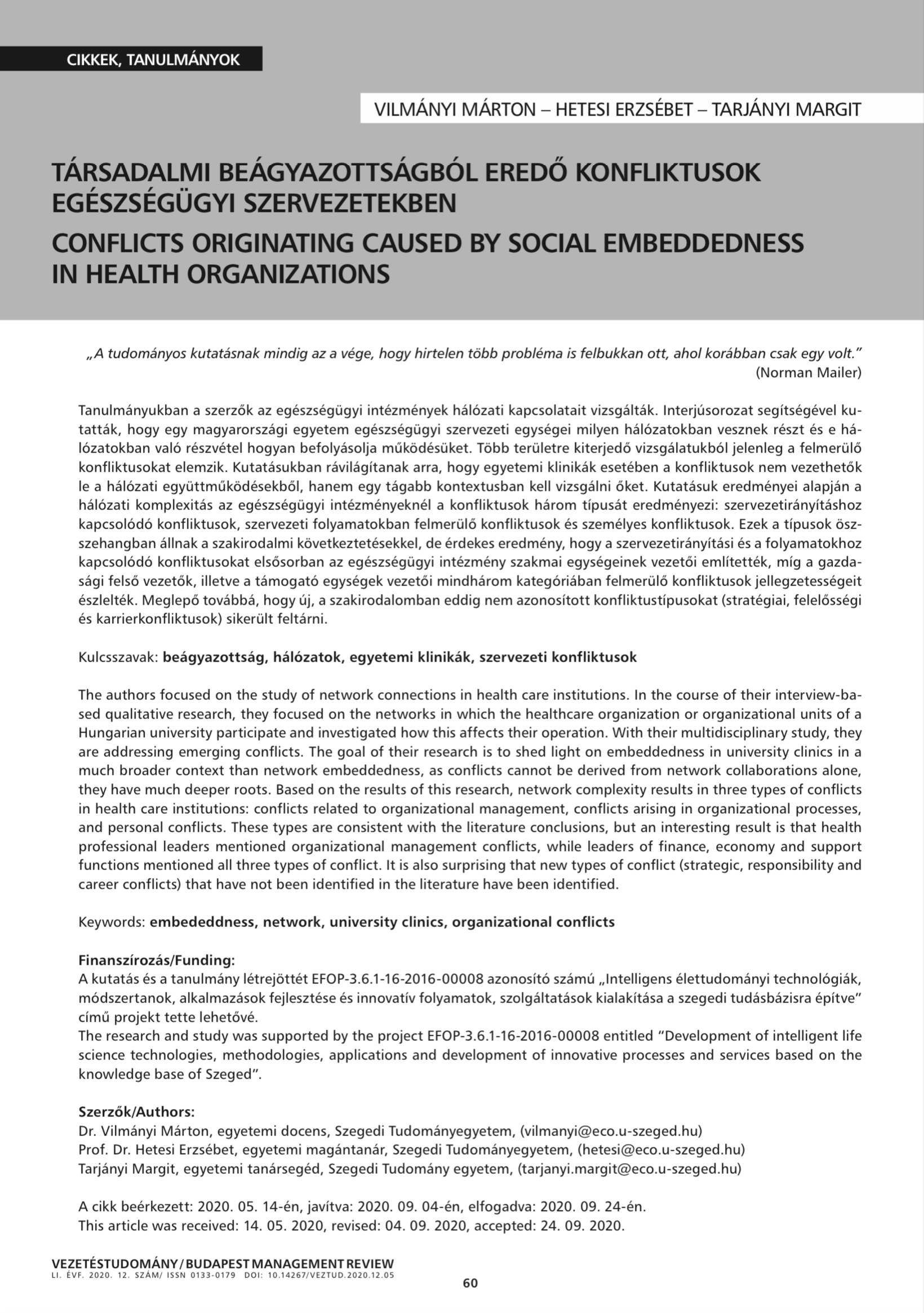Társadalmi beágyazottságból eredő konfliktusok egészségügyi szervezetekben
DOI:
https://doi.org/10.14267/VEZTUD.2020.12.05Keywords:
embeddedness, network, university clinics, organizational conflictsAbstract
The authors focused on the study of network connections in health care institutions. In the course of their interview-based qualitative research, they focused on the networks in which the healthcare organization or organizational units of a Hungarian university participate and investigated how this affects their operation. With their multidisciplinary study, they are addressing emerging conflicts. The goal of their research is to shed light on embeddedness in university clinics in a much broader context than network embeddedness, as conflicts cannot be derived from network collaborations alone, they have much deeper roots. Based on the results of this research, network complexity results in three types of conflicts in health care institutions: conflicts related to organizational management, conflicts arising in organizational processes, and personal conflicts. These types are consistent with the literature conclusions, but an interesting result is that health professional leaders mentioned organizational management conflicts, while leaders of finance, economy and support functions mentioned all three types of conflict. It is also surprising that new types of conflict (strategic, responsibility and career conflicts) that have not been identified in the literature have been identified.
Downloads
References
Antal Z. L. (2018). A gyógyítás társadalmi beágyazottsága. Budapest: Argumentum Kiadó.
Bochatay, N., Bajwa, N. M., Cullati, S., Muller-Juge, V., Blondon, K. S., Perron, N. J., Maitre, F., Chopard, P., Kim, S., Savoldelli, G. L., Hudelson, P. & Nendaz, M. R. (2017). A Multilevel Analysis of Professional Conflicts in Helath Care Teams: Insight for Future Training. Academic Medicine, 99(11), 584–592. https://doi.org/10.1097/ACM.0000000000001912.
Bourdieu, P. (1999). Gazdasági tőke, kulturális tőke, társadalmi tőke. In: Angelusz R. (Eds.). A társadalmi rétegződés komponensei. Budapest: Új Mandátum Könyvkiadó, 156-177.
Chakraborty, S. & Dobrzykowski, D. D. (2013). Supply Chain Practices for Complexity in Healthcare: A Service-Dominant Logic View. The IUP Journal of Supply Chain Management, 10(3), 53–75. https://doi.org/10.1016/S2212-5671(14)00233-0
Coleman, J. S. (1994). Társadalmi tőke. In Lengyel Gy. & Szántó Z. (Eds.), A gazdasági élet szociológiája (pp. 99-127). Budapest: Aula Kiadó.
Coase, R. H. (1960). The Problem of Social Cost. London: CreateSpace Independent Publishing Platform.
Csupor, É., Kuna, Á., Pintér, J. N., Kaló, Zs. & Csabai, M. (2017). Konfliktustípusok és konfliktus kezelés magyar egészségügyi dolgozók körében. Orvosi Hetilap, 158(16), 625-633. https://doi.org/10.1556/650.2017.30736
Etzioni, A. (1988). The Moral Dimension. New York-London: The Free Press, https://doi.org/10.1002/hrm.3930270407
Farkas, Z. (2010). Társadalom-elmélet (második kötet). Budapest: Bíbor Kiadó. Retrieved from http://real.mtak.hu/26593/1/Tarsadalomelmelet_Masodik_kotet.pdf
Glaser, B.G. & Strauss, A.L. (1967). The Discovery of Grounded Theory: Strategies for Qualitative Research. Chicago: Aldine.
Granovetter, M. (1985). Economic Action and Social Structure: The Problem of Embeddednes. American Journal of Sociology, 91(3), 481-510. https://doi.org/10.1086/228311
Granovetter, M. (1992). Economic institutions as social constructions: a framework for analysis. Acta Sociologica, 35(1), 3-11. https://doi.org/10.1177/000169939203500101
Granovetter, M. & Svedberg, R. (1992). Sociology of Economic Life. London: Avalon Publishing.
Habermas, J. (1984). The Theory of Communicative Action: Reason and Rationalization of Society. Boston: Beacon Press.
Hámori, B. (1998). Érzelemgazdaságtan - A közgazdasági elemzés kiterjesztése. Budapest: Kossuth Kiadó.
Kincses Gy. (2007). A hálapénzről – még mindig nem utoljára. Budapest: Egészségügyi Stratégiai Kutatóintézet, ESKI. Retrieved from http://www.kincsesgyula.hu/dokumentumok/halapenzcikk_007_07.pdf
Kincses Gy. (2019). A köz- és a magánszféra szerepe az egészségügyben. Magyar Tudomány, 180(10), 151-152. https://doi.org/10.1556/2065.180.2019.10.11
Kornai J. (1971). Anti-equilibrium. A gazdasági rendszerek elméleteiről és a kutatás feladatairól. Budapest: Közgazdasági és Jogi Könyvkiadó.
Lantos G. (2016). Így keresnek az orvosbárók évi 100 millió forintot. Portfólió, 2016.04.13. Retrieved from https://www.portfolio.hu/gazdasag/20160423/igy-keresnek- az-orvosbarok-evi-100-millio-forintot-230793
Launberg, A. (2011). Commercializing Academic Research Results: When a University wants to Further Innovation. 27th IMP-conference in Glasgow, Scotland. Retrieved from http://www.impgroup.org/uploads/papers/7652.pdf
Mills, M. E. C. (2002). Conflict in Health Care Organisations. Journal of Health Care Law and Policy, 5(2), 502 – 523. http://doi.org/10.1080/08998280.2001.11927749
Mischel, W. (2015). A pillecukorteszt. B udapest: H VG Kiadó.
Mitev, A. Z. (2012). Grounded theory, a kvalitatív kutatás klasszikus mérföldköve. Vezetéstudomány, 43(1). 17-30.
Patton, C. (2014). Conflict in healthcare: A Literature Review. The Internet Journal of Healthcare Administration, 9(1), 1-11.
Polányi K. (1976). A gazdaság mint intézményesített folyamat. In Polányi K. (ed.), Az archaikus társadalom és a gazdasági szemlélet (pp. 228-272). Budapest: Gondolat Könyvkiadó.
Putnam, R. D. (1993). Making Democracy Work. Civic Tradition in Modern Italy. Princeton: Princeton University Press.
Rabin, M. (1998). Pscyhology and Economics. Journal of Economic Literature, 36(1), 11-46. Retrieved from https://www.jstor.org/stable/2564950
Rahim, M. A. (1985). A Strategy for Managing Conflict in Complex Organisations. Human Relations, 38(1), 81-89. https://doi.org/10.1177/001872678503800105
Rahim, M. A. (2002). Toward a Theory of Managing Organisation Conflict. The International Journal of Conflict Management, 13(3), 206–235. http://doi.org/10.2139/ssrn.437684
Raus, K. M ortier, E. & Eeckloo, K. (2018). Organizing Health Care Networks: Balancing Markets, Government and Civil Society. International Journal of Integrated Care, 18(3), :6. https://doi.org/10.5334/ijic.3960
Sackett, D. L., Rosenberg, W. M., Gray, J. A., Haynes, R. B. & Richardson, W. S. (1996). Evidence based medicine: what it is and what it isn’t? The BMJ, 312(7023), 71–72. https://doi.org/10.1136/bmj.312.7023.71
Savage, G. T., Taylor, R. L., Rotarius, T. M. & Buesseler, J. A. (1997). Govenrance of Integrated Delivery Systems/Networks: A Stakeholder Approach. Health Care Management Review, 22(1), 7-20.
Szántó Z. (1994). A gazdaság társadalmi beágyazottsága. Szociológiai Szemle, 1994 (3), 141-145.
Thaler, R. H. (1980). Toward a Positive Theory of Consumer Choice. Journal of Economic Behavior and Organization, 1(1), 39–60. https://doi.org/10.1016/0167-2681(80)90051-7
Tversky, A. & Kahneman, D. (1991). Ítéletalkotás bizonytalanság mellett: heurisztikák és torzítások. In Pápai, Z. & Nagy, P. (eds.), Döntéselméleti szöveggyűjtemény (pp. 77-93). Budapest: Aula Kiadó.
Wagrell, S. (2011). Achieving Innovation in Healthcare: The Public Quasi-Market Paradox. 27th IMP-conference in Glasgow, Scotland. Retrieved from http://www.impgroup.org/uploads/papers/7793.pdf
Weber, M. (1987). Gazdaság és társadalom. A megértő szociológia alapvonalai. Budapest: Közgazdasági és Jogi Könyvkiadó.
Yang, W.-H. , Hu, J.- S., & Chou, Y.-Y. (2010). Analysis of Network Type Exchange in Health Care System: A Stakeholder Approach. Journal of Medical Systems, 36(3), 1569-1581. https://doi.org/10.1007/s10916-010-9618-5
Zukin, S. P. & DiMaggio (eds.) (1990). Structures of Capital. The Social Organization of the Economy. Cambridge: Cambridge University Press.

Downloads
Published
How to Cite
Issue
Section
License
Authors assign copyright to Vezetéstudomány / Budapest Management Review. Authors are responsible for permission to reproduce copyright material from other sources.

